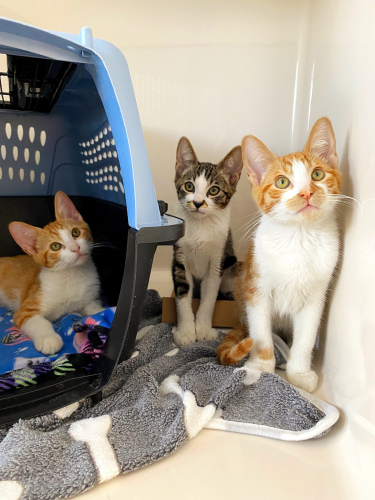How can I tell if my kitten is happy and healthy?
Normal energy, appetite, water intake, and expulsions (bowel movements & urinary output) are all signs of a healthy kitten. Thriving kittens want to spend time with their companions by playing, cuddling, and exploring. The younger the kitten, the more often they sleep (it helps them grow!), so lots of naps aren't concerning unless your kitten seems lethargic or depressed.
How soon should I bring my new kitten to see a veterinarian?
We recommend having kittens seen as soon as possible. This allows your vet to check for any internal or external parasites and any potential congenital (from birth) issues, along with planning out a kitten vaccine & deworming schedule.

How can I get the most out of my first vet visit with my new kitten?
This is the time to ask questions! Anything you need to know, your vet should have an answer for you. Our exams are 40 minutes long, so there is plenty of time to talk to the doctor. We'll also provide you with our digital kitten packet, which is chock full of info regarding kitten behavior, acclimating your kitten to you home, kitten development, etc. We also request that you bring along a stool sample to your visit we can test for any intestinal parasites that may need to be dewormed.
What will a veterinarian look for during an initial kitten care visit?
Your vet will do a "nose-to-tail" exam, meaning they will check out all aspects of your kitten (eyes, nose, ears, etc) to ensure your kitten is healthy and discuss your kittens overall behavior.
What are some early signs and symptoms of health issues in my kitten?
- Lack of appetite
- Poor weight gain
- Swollen or painful abdomen
- Lethargy
- Diarrhea
- Difficulty breathing
- Wheezing or coughing
- Pale gums
- Eye problems
Why is it important to avoid self-diagnosing possible kitten health problems?
Illness in kittens can onset kittens fairly quickly and it's imperative that you call your vet at the first sign that something may be off. They're tiny and their immune systems are still developing, so they are vulnerable. Cats are also very talented at hiding illness (learn more here) so the issue may be deeper or more complex than can be determined on the surface. This is why we recommend your kitten come in for their initial exam as soon as possible, as it gives your vet the chance to establish a relationship with your kitten, which means quicker care if they need to be seen.

When should my kitten get vaccinations?
We recommend having your kitten get started with their vaccinations as soon as 8 weeks old. The core vaccinations recommended for cats - indoor or outdoor - are Rabies, Feline RCP (protects against feline calicivirosis, viral rhinotracheitis, & panleukopenia) and Leukemia. Your veterinarian will create a vaccine plan for your kitten at their initial exam.
What do you need to know about kitten behavior?
All kittens are different! Just like the cats that they grow into, kittens have their own personalities, quirks, & preferences that you get the opportunity to learn. The better you get to know your kitten, the sooner you'll be able to notice if anything is out of sorts with their health & behavior. Check out our article on kitten behavior for more tips!
If you have questions regarding kitten care, give us a call. We’re always here for you!
